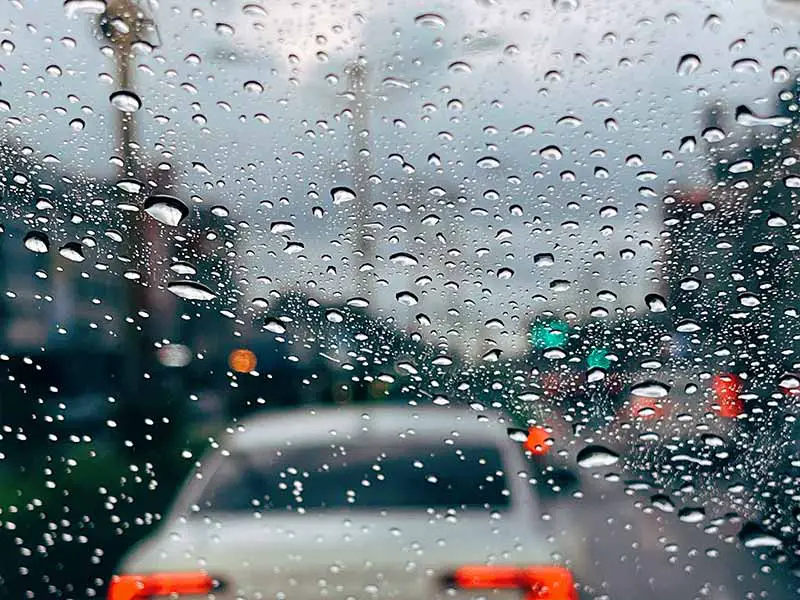Ever been caught in a sudden downpour while driving, your hands gripping the steering wheel as you navigate through the reduced visibility and slick roads? The tires on your vehicle are your only contact with the road, and choosing the right ones can be the difference between a close call and a call to a tow truck.
Are Summer Tires Good In The Rain?
Summer tires are good in the rain. In fact, summer tires perform best for wet weather handling and prevention of hydroplaning. They have wide grooves and a special rubber compound designed to maintain grip in wet conditions and reduce the risk of hydroplaning.
In this article, we’ll delve into the world of summer, all-season, and winter tires, discussing their performance in various conditions, particularly in the rain. We’ll address common questions about tire performance, wear, and how to improve traction in the rain, along with providing advice on selecting the best tires for your driving needs.
Let’s take a closer look.
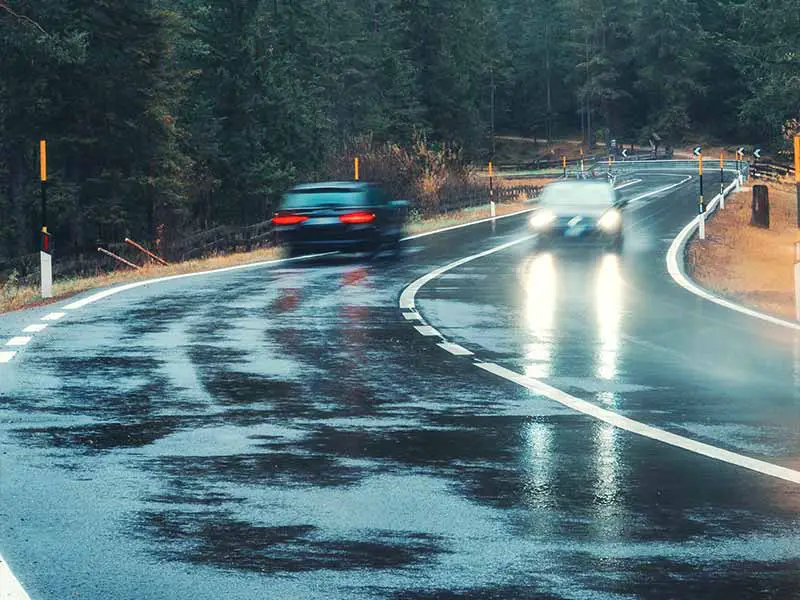
Understanding Different Types of Tires
When you’re buying a new set of tires for your car or truck, the wide variety of options can be quite confusing. Summer tires, all-season tires, winter tires – what’s the difference, right? Let’s break it down and help you get to know your tires a little better.
Summer Tires: Built for Performance
Summer tires, sometimes called performance tires, are designed to provide excellent grip on both dry and wet roads. They’re made from a special type of rubber that stays soft and flexible in warm weather, which allows them to stick to the road better.
- The tread patterns on summer tires are usually simpler with fewer, though wider, grooves, which provides more tire surface to grip the road.
- They are built to handle high speeds and provide precise handling.
- However, summer tires are not great for cold weather or snow. In cold temperatures, the rubber can harden, causing a loss of traction.
Summer tires can be a good choice if you live in a region that doesn’t get super cold or snowy in winter, or if you have a separate set of winter tires for when the mercury drops.
All-Season Tires: Jack of All Trades
All-season tires are designed to handle a bit of everything. They’re like the Swiss army knife of tires – not perfect for any one situation, but good enough for most.
- They have more complex tread patterns than summer tires, which helps them handle a wider range of conditions.
- They’re made from a type of rubber that stays flexible in both warm and cool weather, although not to the same extremes as summer or winter tires.
- While they can handle light snow, they aren’t the best choice for heavy snow or icy conditions.
All-season tires are a good compromise if you live in a region with moderate weather conditions year-round, or if you don’t want to switch between summer and winter tires.
Winter Tires: Your Cold Weather Friend
Winter tires, also known as snow tires, are designed to handle cold temperatures, snow, and ice.
- They’re made from a special type of rubber that stays flexible even in freezing temperatures, which helps them grip the road better.
- They also have unique tread patterns with lots of grooves and cuts (called sipes) that can bite into snow and ice, providing better traction and control.
Keep in mind that snow tires are not just for snow. They start to outperform other tires as soon as temperatures drop below 45°F (7°C), even on dry pavement.
But once the weather warms up, you’ll want to switch them out. Snow tires wear down quickly in warm weather, and their soft rubber can feel squishy and imprecise on dry roads.
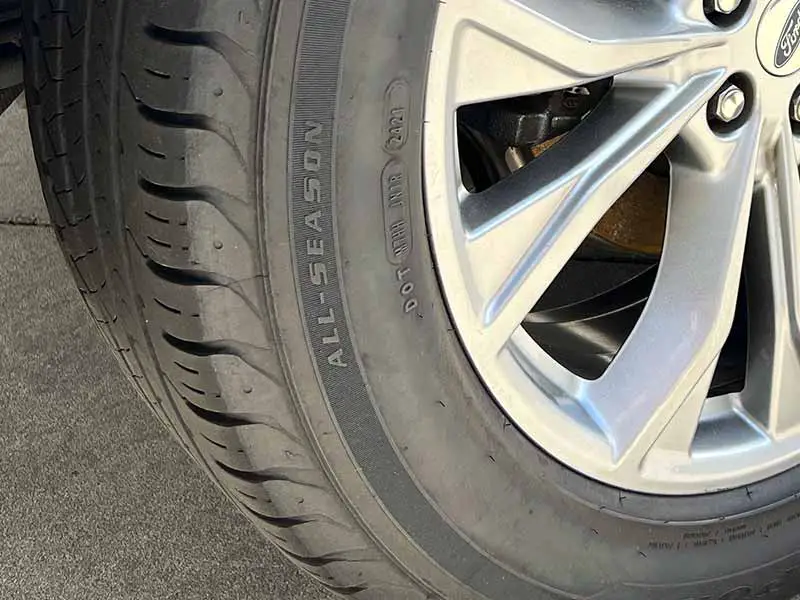
Summer Tires vs. All-Season Tires in Rain
Rain can make roads slippery and tricky to navigate, and different types of tires handle wet conditions in different ways. Let’s put summer tires and all-season tires in the spotlight and see how they measure up when the skies open up.
Summer Tires: Born to Handle the Wet
You might be thinking, “Hey, they’re called ‘summer’ tires, so they’re only for sunny weather, right?” Not exactly! Summer tires are actually designed to be really good in the rain.
- The reason lies in their tread pattern. The grooves on a summer tire are designed to effectively channel water away from the contact area between the tire and the road, helping to prevent hydroplaning.
- Summer tires also have sticky compounds that provide great grip, even on wet surfaces.
- Remember, though, that while they’re great in warm, wet conditions, summer tires aren’t made for cold or snowy weather.
All-Season Tires: Reliable Rain Companions
All-season tires are designed to give you reasonable performance in a variety of conditions, and that includes rain.
- The tread patterns on all-season tires are more complex than those on summer tires. This design aims to balance dry, wet, and light snow performance.
- All-season tires can handle wet weather, but they may not have the same level of grip as a summer tire, especially in heavy rain or at high speeds.
- However, unlike summer tires, all-season tires can also handle cooler temperatures and light snow.
Comparison: Wet Weather Handling
Comparing summer and all-season tires in the rain isn’t exactly apples to apples. Summer tires generally have the edge in terms of raw grip and water evacuation, helping to reduce the risk of hydroplaning. But that doesn’t mean all-season tires are bad in the rain – far from it!
They provide a solid compromise, with reasonable wet weather performance and the added benefit of being able to handle a range of other conditions, including light snow and cooler temperatures. Remember, though, they might not perform as well as summer tires in heavy rain or at higher speeds.
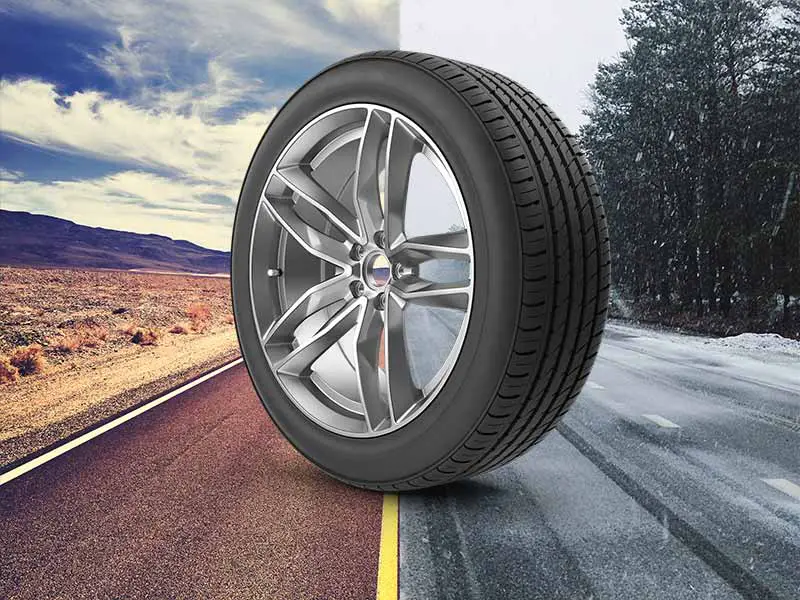
Are Summer Tires Better Than Winter Tires in Rain?
You might be scratching your head a bit on this one. After all, winter tires are designed for the cold, and well, rain is water and water is cold, so…winter tires should be great in the rain, right? Let’s break down the details and compare summer and winter tires in wet conditions.
Winter Tires: Kings of the Cold, but Not the Rain
Winter tires are absolutely amazing in snow and cold weather, no doubt about it. They’re made of a special rubber compound that stays flexible in freezing temperatures, and their tread patterns are designed to grip onto snow and ice.
- The deeper grooves and numerous sipes (small slits) in the tread help the tire bite into snow and pump away slush.
- However, these same features don’t translate as well to wet, rainy conditions. The deep tread grooves that are so helpful in snow can cause the tire to “float” on water, a dangerous situation called hydroplaning.
- Plus, as temperatures rise above 45°F (7°C), the rubber in winter tires becomes too soft and can wear out quickly.
Summer Tires: Rain or Shine, They’re Fine
On the flip side, summer tires are built for performance in both dry and wet conditions during warmer months.
- Their tread patterns are designed to expel water and prevent hydroplaning, which is a big deal when you’re driving in the rain.
- Summer tires are made from a rubber compound that’s designed to stay grippy and firm in warm weather, providing good traction and handling even when it’s wet out.
- Remember though, summer tires don’t perform well in cold or snowy conditions.
The Verdict: Summer Tires Outshine Winter Tires in the Rain
When it comes down to performance in the rain, summer tires have the upper hand. They’re designed to handle wet conditions and can help prevent hydroplaning, making them a safer choice for driving in the rain.
Winter tires, while unbeatable in snowy, icy conditions, are not as well-suited to handle rain. They can actually increase the risk of hydroplaning and tend to wear out quickly in warmer, wet conditions.
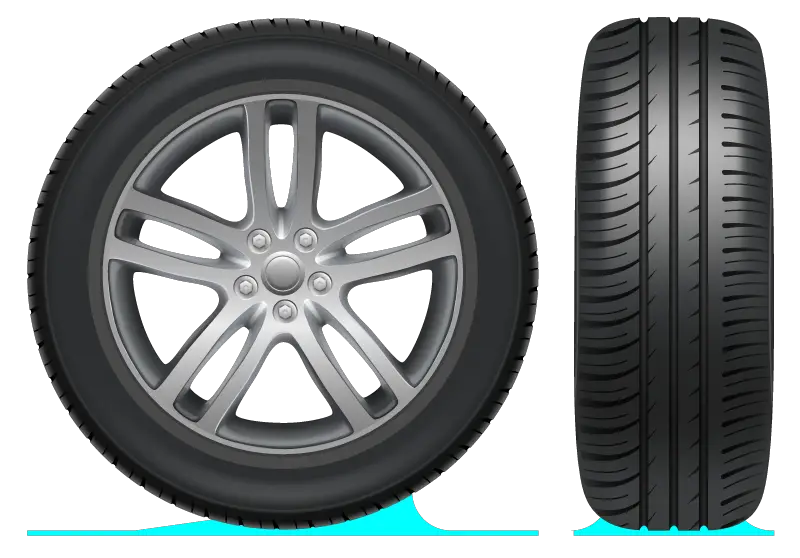
What Tires are Best for Rain?
As a driver, wet weather can be a big challenge. Not only is visibility reduced, but the roads get slippery, increasing the risk of hydroplaning. So, let’s talk about the best tires for those rainy days.
The Strengths of Summer Tires in the Rain
Summer tires, despite their name, are a strong contender for driving in the rain.
- These tires feature wide, straight grooves and a tread pattern designed to expel water, reducing the risk of hydroplaning.
- The rubber compound of summer tires is designed to stay soft and provide excellent grip on both wet and dry roads during warmer months.
- Keep in mind that these tires are not designed for cold or snowy conditions. Their performance drops significantly as temperatures fall below 45°F (7°C).
All-Season Tires: A Balanced Option
All-season tires are a versatile choice and can handle wet weather reasonably well.
- Their tread patterns are a compromise, designed to handle a bit of everything: dry roads, wet roads, and even light snow.
- However, in heavy rain or at high speeds, all-season tires may not perform as well as summer tires in terms of grip and preventing hydroplaning.
- On the plus side, you can use all-season tires all year round, unlike summer tires which are not suitable for cold weather.
Rain Tires: Specialized for Wet Conditions
While less common for everyday driving, there’s a type of tire known as a “rain tire” designed specifically for wet weather.
- Rain tires have deep grooves and a soft rubber compound to provide maximum grip on wet roads.
- They’re primarily used in motorsports but can also be found for passenger cars in some markets. However, they’re not really practical for everyday use since they wear down quickly on dry roads and aren’t suitable for snowy or icy conditions.
The Top Pick: It’s All About Conditions
When it comes to the best tires for rain, summer tires generally perform the best. They’re designed to handle warm, wet conditions, reducing the risk of hydroplaning and providing good grip.
However, if you’re looking for a tire that can handle a variety of conditions year-round, all-season tires might be your best bet. They provide a good balance of performance in dry, wet, and lightly snowy conditions.
How To Prevent Hydroplaning
Hydroplaning can be a scary experience. This happens when your tires lose contact with the road and ride atop a thin layer of water instead, causing your vehicle to skid or slide uncontrollably. Here are some helpful tips on how to prevent hydroplaning and maintain control of your vehicle when driving in the rain.
Choose the Right Tires
Having the right tires for your vehicle and the weather conditions is the first step to prevent hydroplaning. Summer tires are a great option for wet, warm conditions due to their tread design and rubber compounds that offer good grip and effective water channeling.
Maintain Your Tires
Regular maintenance is crucial for tire safety and performance. This includes:
- Keeping your tires properly inflated: Underinflated tires can’t maintain their shape and become flatter, which increases the risk of hydroplaning.
- Regular tire rotation: This helps ensure even wear, extending the life of your tires and maintaining good performance.
- Checking the tread depth: Tires with worn treads can’t channel water effectively, increasing the risk of hydroplaning. Replace your tires when the tread depth is below 1/16 of an inch or 1.6mm.
Adjust Your Driving Habits
How you drive can also affect the likelihood of hydroplaning.
- Slow down: Driving at a slower speed reduces the chance of hydroplaning as it allows your tires to scatter the water more effectively.
- Avoid puddles and standing water: If possible, steer clear of places where water has collected on the road.
- Drive in the tracks of the vehicle ahead: Their tires have already dispersed some of the water.
- Avoid hard braking and sudden turns: These actions can cause skidding or sliding, especially on wet roads.
Resources
Below are some links you may find helpful when learning about tires
- Summer tires vs all-season tires: Which are best for you? – Les Schwab
- Best tires to use in the rain – Autoweek
Final Thoughts
Choosing the right tires for your vehicle depends on a variety of factors including your driving needs, habits, and the typical weather conditions in your region. Summer tires, despite their name, are not just for clear, sunny days but also provide excellent grip and handling in wet, warm conditions, reducing the risk of hydroplaning. They do wear out faster due to their soft, performance-oriented rubber compounds, and aren’t suitable for cold weather or snow.
On the other hand, all-season tires provide a balanced performance in a wide variety of conditions, including light snow, and typically have a longer lifespan. While they handle wet conditions reasonably well, they might not match the grip and water channeling capabilities of summer tires in heavy rain.
Remember, irrespective of the type of tires you use, regular maintenance, mindful driving, and timely replacement when the tread is worn are crucial for your safety on the road. Always ensure your tires are fit for the weather and driving conditions you’re about to face.
Good luck and happy motoring.
